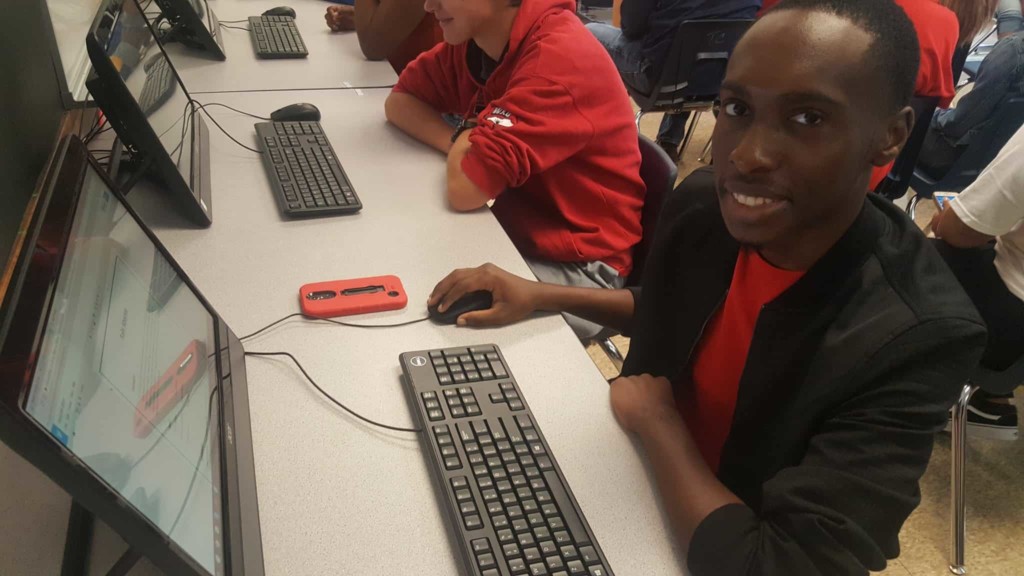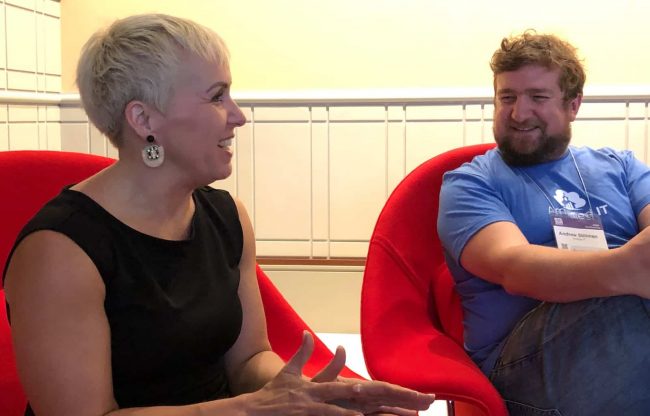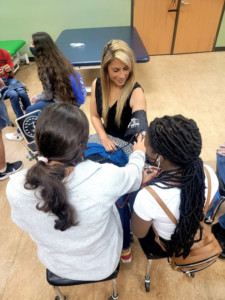Beyond Report Cards: Louisville Students Use Portfolios to Curate and Defend Their Personal Learning Record

The close of the school year brings the joy of graduation and promotion ceremonies across the country. Students, teachers, and parents reflect on the learning and growth of the past year and look forward to the new opportunities and experiences in the school year to come. As a way to document this progress, students are given a report card–often a single page–as the distillation and evidence of how they performed over the previous 180 days.
In elementary school, the report card usually provides a letter or number grade associated with a broad intellectual discipline such as math, science, art, social studies, or English. At the secondary level, descriptions of what a student has studied become a bit more descriptive. In middle and high school, the broad label of math used in elementary school is replaced with course titles of algebra, geometry or pre-calculus; the label of science is specified as biology, chemistry, or physics.
And, if after 13 years of effort–after numerous assignments of diorama creations, tests, essays, group projects, and other forms of school work and homework–students met or exceeded the requirements established by the community, they are rewarded a graduation ceremony and two more documents: the transcript and the diploma. The diploma confirms that the student has completed all requirements for graduation and the transcript provides a record of which course combination this student used to meet those requirements.
These documents serve as the official record needed for matriculation into college and entry into the work world. This system, which is nearly ubiquitous across the United States, provides little to no actual details of what was done during the time in school, no artifacts of the student effort, and no gauge of the student’s accomplishments or readiness in the skills of living in the world after high school graduation.
Educators in Louisville, Ky., have taken a systematic and impactful approach to remedy the limitations of the traditional educational record. They are prioritizing documenting the unique learning path of each student, enabling both reflection and presentation by the learner at transition points, and providing connections from that learning to affirmations of readiness for the next level of expectation in life. This solution is the Backpack of Success Skills initiative in Jefferson County Public Schools (JCPS).
Backpack of Success Skills
The Backpack of Success Skills initiative in Jefferson, Ky., provides a platform for students to archive digital learning “artifacts”– assignments, creations, reflections, recordings, and other files showing effort, challenge, and accomplishment.
Like a physical backpack, the Backpack of Success Skills allows items, in this case digital records or representations of learning, to be securely stored and carried. Students are encouraged to archive learning artifacts throughout the year and to start early in the grade. Items should reflect both exemplars of good work and learning experiences that are personally meaningful. Placing items into the backpack is an empowering act for students to tell others, and themselves, that they have produced proof of their learning, for an empty backpack implies an unaccomplished and unprepared student.
As the year progresses, students are encouraged to make sure that their backpack contains representative samples of their learning across subject areas and personal accomplishments. But, traditional subject matter disciplines of math, English, science, social studies or art are not the organizing principle of what should be in the backpack. JCPS worked with the broader Louisville community of businesses, nonprofits, parents, and interest groups to ensure that the backpacks at every age are “stocked with supplies” for the post-graduation world. This extensive dialogue resulted in identifying five Success Skills that each student should demonstrate growth and success in each year.
The Success Skills serve as a set of unifying college, career, and life-readiness indicators for each student, family, and employer. These skill domains are:
- Emerging innovator
- Productive collaborator
- Effective communicator
- Globally and competent citizen
- Prepared and resilient learner
These skills reflect the behaviors and attitudes with which the community is hoping for students to graduate. Traditionally, quality transcripts and proficient test scores provided confidence of success after graduation. These skill domains serve as an organizing principle for how documents are filed in the backpack because they reflect how learning is organized for the students in the schools. Throughout a given school year, and across school years as each student progresses, artifacts of learning that provide evidence of growth or reaching milestones of accomplishment are retained in the backpack. There should be a diversity in the types of evidence placed in the backpack–a variety of modalities of expression which show utilization of text, pictures, presentations, and video created by the student.
The creation of these learning artifacts is part of the standard curriculum. Selecting which of these creations gets placed in the backpack is a determination of the student in dialogue with their teachers. Through the process of item curation, students develop meta-cognitive skills while maintaining their agency in asserting their own level of mastery of the Success Skills. The backpack’s curated content evolves over time. It should never be empty; nor should the backpack be over-stuffed with random items. There is structure and intent in how the student fills the backpack. It is a completely personalized assessment system.
The Best Demonstration of Readiness is a Great Defense
An important application of the backpack occurs at the transition points for students between elementary and middle school, between middle and high school, and at the point of graduation. The depth of the backpack defense process can be seen in this Dunn Elementary video.
Students are required to establish their readiness for promotion to the next grade band through a presentation to adults. This presentation is similar to a dissertation defense in higher education. Each student presents their readiness for what will come next by unpacking their backpack and presenting evidence. The presentation is guided by the Success Skills, and their personal journey and status in developing these skills. This provides a much higher level of application and comprehension on the student’s part, and establishes a more fully rounded sense of the student’s capabilities on the educator’s part than is provided by a home work, a course grade, isolated performance task, or a state or national test score. Terrance Sullivan, a state director at KnowledgeWorks, reported how impressed he was with the implementation based on his visit and participation in the defense process.
Maintaining consistent messaging and ensuring multiple ways for students, parents, and community to understand the what, how, and why of the Backpack for Success Skills has enabled a successful and celebrated roll-out. In addition to the district website, there is a dedicated website for access to make access easy and a consistent social media handle (@JCPSBackpack) on Facebook, Instagram, and Twitter. The deep engagement of the community in defining the backpacks and their use as transition experiences for students is being extended through the implementation process.

Backpack Backstory
Jefferson County, Ky., which includes Louisville, is by far the largest in the state. The county school district serves over 100,000 students.
Chief Academic Officer Carmen Coleman is well known in the state for her contributions to deeper learning. Five years ago, as superintendent in Danville (an hour south of Lexington) Coleman lead the creation of a diploma system based on demonstration. She continually asks, “What do students need to be well equipped for successful futures, and what kinds of experiences will help them most?”
Coleman joined Jefferson County Public Schools two years ago. She helped Superintendent Marty Pollio shape the district’s strategic plan, Vision 2020: Excellence with Equity. The plan establishes the five Success Skills, the Backpack of Success Skills, and the process of Backpack defenses.
Coleman selected Google for Education partner Amplified IT as a technology partner for the portfolio system. The portfolio leverages features of Google Drive.
And the expansion of the backpack language has recently been expanded into a Summer Backpack League for students. Learning, and its documentation, occurs with students both in and out of the school building, hours, or year.
The Backpack of Success Skills initiative enables students to take their proof of learning with them into their next challenge. Whether that transition is into middle school, high school, or college/career and beyond, the student can show what they know and provide the context for why that artifact demonstrates their readiness for new challenges. Both the individual artifacts, and the overall collection of objects, provide a unique reflection of the journey, learning, and growth of the student. More than a scrapbook, more than a collection of souvenirs, the Backpack is both a repository of educational attainment and a toolbox to be used in future learning environments.
Where can Students, Educators and Policymakers Go With Backpacks?
This innovative solution that JCPS has accomplished combines the documentation and portability of digital documentation, the skills of reflection and curation, and the expectation of presentation and performance assessments. This integrated learning, assessment, and life readiness approach builds on previous initiatives across the country.
Getting Smart reported on Utah’s SB82 (2013) which established a statutory expectation and framework for schools and families to manage digital records of traditional data elements in 2013 by establishing Student Achievement Backpacks. This bill was informed by the white paper Data BackPacks: Portable Records & Learner Profiles from 2012.
There are many applications and websites providing customizable digital storage and portfolio creation. Other innovative schools have introduced student defense of work for graduation and there is a growing literature related to performance assessments.
JCPS is doing trailblazing work for educators across the country by meeting the needs of their students and community. And the high quality of their systemic approach is providing an exemplar of successful implementation. While parents in Louisville are ensuring that their students have lunch and homework in their backpack to go to school each day, JCPS is ensuring that students are being promoted and graduate with a backpack of learning for life.
For more see:
- Deeper Learning For All: The Equity Agenda in Louisville (podcast with Carmen Coleman)
- Leading for Powerful Learning: Observations & Pictures from Danville
- The Transformational Leader (by Carmen Coleman)
Stay in-the-know with all things innovations in learning by signing up to receive the weekly Smart Update.







0 Comments
Leave a Comment
Your email address will not be published. All fields are required.